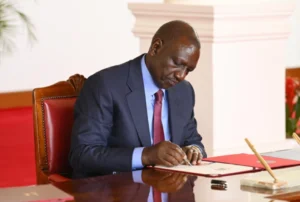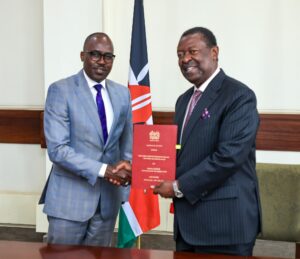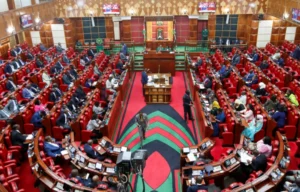New Anti-Corruption Bill Boosts EACC Mandate to Rein in Public Servants
The President noted that the law is introducing strict provisions to promote transparency, integrity, and accountability among public officials.

The primary purpose of the law is to harmonize conflict of interest laws. It repeals the Public Officer Ethics Act and enacts a uniform legal framework for managing conflict of interest in public service under one authority, namely EACC. Photo / Citizen Digital
By juliet Jerotich
Kenya has intensified the anti-corruption push following the signing of the Conflict of Interest Bill into legislation. President William Ruto, while making the announcement on Wednesday at State House Nairobi, said the new legislation is aimed at combating abuse of public office and ensuring state property is properly managed.
The President noted that the law is introducing strict provisions to promote transparency, integrity, and accountability among public officials. Additionally, it empowers citizens to hold public servants accountable.
“This is a significant turning point for Kenya. We are making it much harder for individuals to exploit the offices they have been entrusted with,” declared President Ruto.
The new Act has also entrusted the Ethics and Anti-Corruption Commission (EACC) with broader powers to institute the law, particularly on matters of the declaration of wealth. The mandate has been extended from the Executive to cover the Legislature and Judiciary as well. “With these new provisions, the EACC now has the tools to safeguard Kenya’s resources and make every public officer accountable,” Ruto stated.
The primary purpose of the law is to harmonize conflict of interest laws. It repeals the Public Officer Ethics Act and enacts a uniform legal framework for managing conflict of interest in public service under one authority, namely EACC. The Act consolidates previously dispersed provisions into a single general standard that applies uniformly to all public officers. It specifically forbids nepotism and unjustified outside interference in state contracts and restricts secondary employment that would compromise public work or lead to conflicting interests.
Originally tabled in Parliament in April 2025 with presidential recommendations, the resubmitted Bill was then respectively approved by both the National Assembly on June 3, 2025, and the Senate on July 23, 2025, before final assent.
In the same event, President Ruto also signed into law the Social Protection Bill. He explained that the bill strengthens the government’s commitment to supporting vulnerable citizens by establishing a broad, rights-based framework. The legislation guarantees that non-contributory assistance benefits reach truly deserving Kenyans at all stages of life and upholds their dignity as well as promotes fairness and resilience.
“Congratulations to the Cabinet Secretary for social protection. With this law, you now have a solid foundation to actually perform your ministry’s mandate,” the President said.
The ceremony was attended by key government leaders, including National Assembly Speaker Moses Wetang’ula, Senate Speaker Amason Kingi, Attorney-General Dorcas Oduor, and Labour and Social Protection Cabinet Secretary Alfred Mutua.





